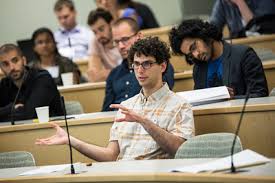Russell Golman
Associate Professor
Ph.D. in Mathematics
- Porter Hall 319A
- 412-268-9861
- 412-268-6938
Bio
Russell Golman is an Associate Professor of Behavioral Economics and Decision Sciences in the Social & Decision Sciences Department at CMU. His pioneering, interdisciplinary work has been published in a wide range of academic journals, including Science Advances, Psychological Review, Cognitive Psychology, Decision, the RAND Journal of Economics, the Journal of Economic Theory, the Journal of Economic Perspectives, and the Journal of Economic Literature. He has edited a special issue of the journal Games on Behavioral Game Theory. In 2017 Professor Golman organized the Belief-Based Utility Conference at Carnegie Mellon with generous funding from the Russell Sage Foundation and the Alfred P. Sloan Foundation.
Research Interests
Professor Golman combines economics, psychology, and mathematics to develop theories about why people (and societies) make the choices they make. His landmark behavioral decision research on the topic of belief-based utility offers new insights about when people will actively avoid useful information or be driven by curiosity to obtain useless information and when they will find uncertainty to be exciting or to be uncomfortable. His behavioral game theory research provides a new understanding of the process of strategic deliberation, offering better predictions of one-shot play across a range of games as well as new predictions about response time patterns and time pressure effects. His research on complex social dynamics shows how social actors (humans, firms, or even social insects) gather information from each other in order to innovate and generate novelty, outside of equilibrium.
Selected Publications
Golman, Russell, Nikolos Gurney, and George Loewenstein. “Information Gaps for Risk and Ambiguity.” Psychological Review 2020, forthcoming.
Golman, Russell, Sudeep Bhatia, and Patrick Kane. “A Dual Accumulator Model of Strategic Deliberation and Decision Making.” Psychological Review 2020, 127: 477-504.
He, Lisheng, Russell Golman, and Sudeep Bhatia. “Variable Time Preference.” Cognitive Psychology 2019, 111: 53-79.
Golman, Russell and George Loewenstein. “Information Gaps: A Theory of Preferences Regarding the Presence and Absence of Information” Decision, 2018, 5: 143-164.
Golman, Russell, David Hagmann, and George Loewenstein. “Information Avoidance.” Journal of Economic Literature, 2017, 55: 96-135.
Featured on The Academic Minute
Golman, Russell, George Loewenstein, Karl Ove Moene and Luca Zarri. “The Preference for Belief Consonance.” Journal of Economic Perspectives 2016, 30: 165-187.
Golman, Russell and Steven Klepper. “Spinoffs and Clustering.” Rand Journal of Economics 2016, 47: 341-365.
Golman, Russell, David Hagmann and John Miller. “Polya’s Bees: A Model of Decentralized Decision Making.” Science Advances 1 (2015).
